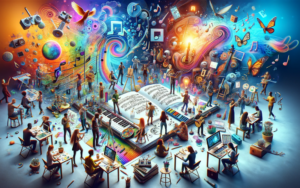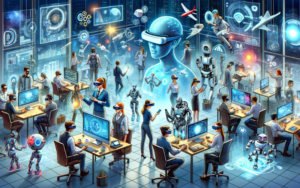Embracing the Era of Intelligent Applications: Gone are the days when your phone was just a phone, and your music player simply played music. We are now entering the era of intelligent applications, where apps learn, adapt, and even anticipate your needs. This revolution is set to reshape how we interact with technology, and its implications are vast.
The Reality of Intelligent Applications
Imagine an app that remembers your preferred coffee order, proactively suggesting it on a chilly morning. Or a fitness tracker that adjusts its workout recommendations based on your progress and preferences. These scenarios, once science fiction, are becoming reality thanks to the rise of intelligent applications.
The Core of Intelligent Applications: Machine Learning
What exactly makes an application “intelligent”? It’s not just about fancy interfaces or impressive animations. At the heart of it all lies machine learning (ML), a branch of artificial intelligence that allows computers to learn from data without explicit programming. By analyzing vast amounts of information, these applications can identify patterns, make predictions, and even adapt their behavior over time.
Intelligent Applications in Healthcare
Intelligent apps are making waves in various industries, including healthcare. They can analyze medical data to personalize treatment plans, predict potential health risks, and even offer real-time support to patients.
Intelligent Applications in Finance
In the financial sector, intelligent applications offer personalized financial advice, automated fraud detection, and tailored investment strategies.
Intelligent Applications in Retail
Imagine a shopping experience where recommendations are curated based on your past purchases, preferences, and even emotional state. Intelligent applications are making personalized retail a reality.
Intelligent Applications in Education
In the education landscape, adaptive learning platforms that adjust to individual learning styles and pace are revolutionizing the way we learn.
Challenges and Considerations
However, the rise of intelligent applications also raises questions about privacy, bias, and control. Ensuring that these applications use data responsibly and ethically is crucial. Additionally, addressing potential biases embedded in algorithms and maintaining human control over these intelligent systems are critical challenges that need to be addressed.
Conclusion: Navigating the Future of Intelligent Applications
Despite these challenges, the potential of intelligent applications is undeniable. They offer the promise of personalized experiences, improved efficiency, and even breakthroughs in various fields. As developers and users, we must navigate this exciting landscape responsibly, ensuring that intelligent applications serve as forces for good, empowering and enriching our lives. The rise of intelligent applications is a double-edged sword. On one hand, they promise a future of personalized experiences, increased efficiency, and potentially revolutionary advancements in diverse fields. On the other, concerns about privacy, bias, and control loom large. As we navigate this exciting, yet complex landscape, the path forward demands a proactive approach. We must actively engage in conversations about responsible development, ensuring that these intelligent applications serve as ethical and empowering tools, not just for select individuals, but for society as a whole. By fostering collaboration between developers, policymakers, and users, we can ensure that the future of intelligent applications is bright, fair, and beneficial for all. So, let’s not be passive observers in this digital transformation. Let’s use our voices, engage in discourse, and ensure that this technological revolution empowers us, not controls us. Remember, the key to shaping a responsible and ethical future for intelligent applications lies not just in the technology itself, but in the hands of all of us.





